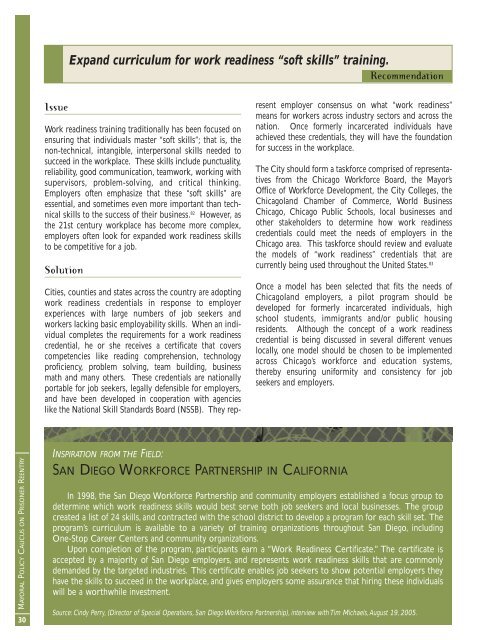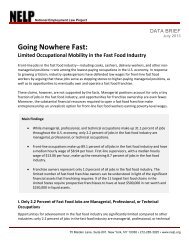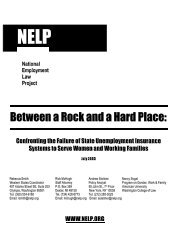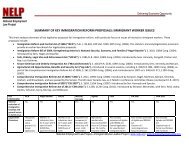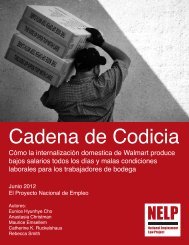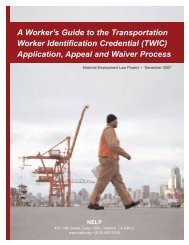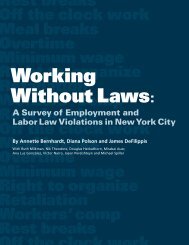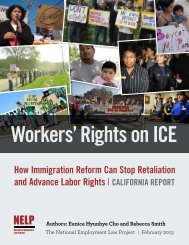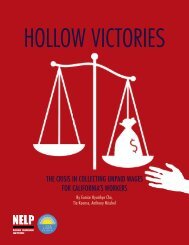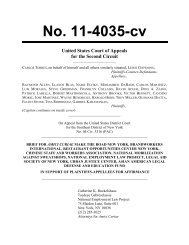Rebuilding Lives. Strengthening Communities.
Rebuilding Lives. Strengthening Communities.
Rebuilding Lives. Strengthening Communities.
Create successful ePaper yourself
Turn your PDF publications into a flip-book with our unique Google optimized e-Paper software.
Expand curriculum for work readiness “soft skills” training.<br />
Recommendation<br />
Issue<br />
Work readiness training traditionally has been focused on<br />
ensuring that individuals master “soft skills”; that is, the<br />
non-technical, intangible, interpersonal skills needed to<br />
succeed in the workplace. These skills include punctuality,<br />
reliability, good communication, teamwork, working with<br />
supervisors, problem-solving, and critical thinking.<br />
Employers often emphasize that these “soft skills” are<br />
essential, and sometimes even more important than technical<br />
skills to the success of their business. 82 However, as<br />
the 21st century workplace has become more complex,<br />
employers often look for expanded work readiness skills<br />
to be competitive for a job.<br />
Solution<br />
Cities, counties and states across the country are adopting<br />
work readiness credentials in response to employer<br />
experiences with large numbers of job seekers and<br />
workers lacking basic employability skills. When an individual<br />
completes the requirements for a work readiness<br />
credential, he or she receives a certificate that covers<br />
competencies like reading comprehension, technology<br />
proficiency, problem solving, team building, business<br />
math and many others. These credentials are nationally<br />
portable for job seekers, legally defensible for employers,<br />
and have been developed in cooperation with agencies<br />
like the National Skill Standards Board (NSSB). They represent<br />
employer consensus on what “work readiness”<br />
means for workers across industry sectors and across the<br />
nation. Once formerly incarcerated individuals have<br />
achieved these credentials, they will have the foundation<br />
for success in the workplace.<br />
The City should form a taskforce comprised of representatives<br />
from the Chicago Workforce Board, the Mayor’s<br />
Office of Workforce Development, the City Colleges, the<br />
Chicagoland Chamber of Commerce, World Business<br />
Chicago, Chicago Public Schools, local businesses and<br />
other stakeholders to determine how work readiness<br />
credentials could meet the needs of employers in the<br />
Chicago area. This taskforce should review and evaluate<br />
the models of “work readiness” credentials that are<br />
currently being used throughout the United States. 83<br />
Once a model has been selected that fits the needs of<br />
Chicagoland employers, a pilot program should be<br />
developed for formerly incarcerated individuals, high<br />
school students, immigrants and/or public housing<br />
residents. Although the concept of a work readiness<br />
credential is being discussed in several different venues<br />
locally, one model should be chosen to be implemented<br />
across Chicago’s workforce and education systems,<br />
thereby ensuring uniformity and consistency for job<br />
seekers and employers.<br />
MAYORAL POLICY CAUCUS ON PRISONER REENTRY<br />
30<br />
INSPIRATION FROM THE FIELD:<br />
SAN DIEGO WORKFORCE PARTNERSHIP IN CALIFORNIA<br />
In 1998, the San Diego Workforce Partnership and community employers established a focus group to<br />
determine which work readiness skills would best serve both job seekers and local businesses. The group<br />
created a list of 24 skills, and contracted with the school district to develop a program for each skill set. The<br />
program’s curriculum is available to a variety of training organizations throughout San Diego, including<br />
One-Stop Career Centers and community organizations.<br />
Upon completion of the program, participants earn a “Work Readiness Certificate.” The certificate is<br />
accepted by a majority of San Diego employers, and represents work readiness skills that are commonly<br />
demanded by the targeted industries. This certificate enables job seekers to show potential employers they<br />
have the skills to succeed in the workplace, and gives employers some assurance that hiring these individuals<br />
will be a worthwhile investment.<br />
Source: Cindy Perry, (Director of Special Operations, San Diego Workforce Partnership), interview with Tim Michaels, August 19, 2005.


